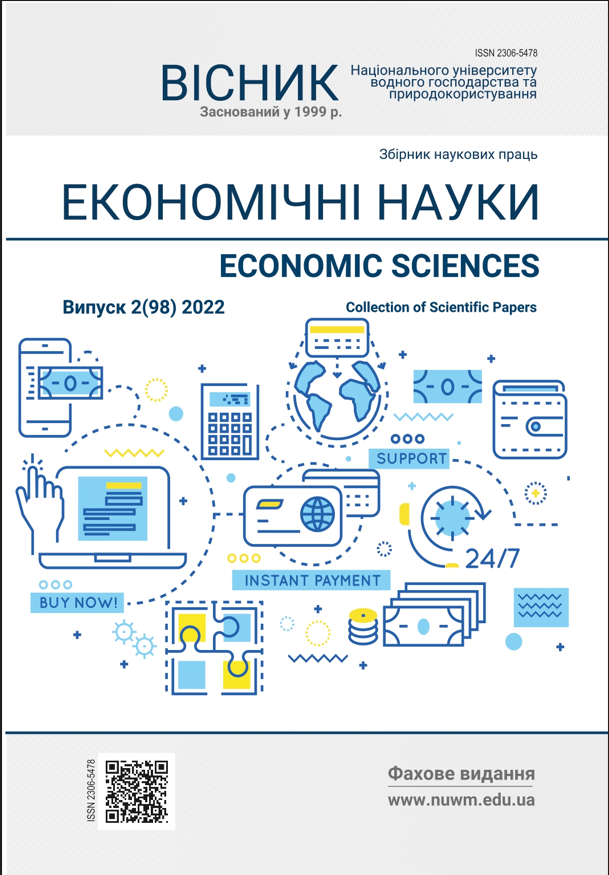EMOTIONAL MANAGEMENT AS A TOOL TO ENSURE BUSINESS PRODUCTIVITY GROWTH
DOI:
https://doi.org/10.31713/ve220221Keywords:
emotional management, emotional intelligence, emotions, socio-psychological climate, situational management, strategic management.Abstract
It is proved that in modern conditions of increasing competition, business is forced to use an innovative tool – emotional management to ensure the growth of its productivity. It is noted that the basis of emotional management is emotional intelligence, the use of which helps the business manager to create a comfortable team and perform tasks. It has been found that the best incentive for employees to work is to stimulate their interest in it, which generates enthusiasm, which is reflected in productivity. It has been established that the greater the interest in work among employees, the greater the dynamics of productivity growth. It was established that the main task of the manager is to set such goals and tasks for employees that they will be interested in achieving. The manager is obliged to choose a motivational key for each employee.The types of emotions and forms of their manifestation are revealed. The emotion management mechanism is reflected, it involves the use of management tools, namely: situational and strategic. The use of situational involves the expression of an immediate emotional reaction to emerging events and the control of the reaction in response. Strategic management is based on the conscious experience of each moment and the analysis of emotions.Formal features that can be used to monitor the socio-psychological climate (emotions) in the team and ways to transform them are proposed. It has been proven that the manifestation of conflicts in the team is not necessarily a problem for the manager. The main thing is to determine the type of conflict and it can be resolved with the involvement of mediators.Using a color scheme, the types of people are displayed and the manifestation of emotions of each of them and ways to overcome negative ones that cause stress are shown. Suggested techniques for coping with stress that a manager can apply.References
Захарчин Г. М., Любомудрова Н. П. Емоційний інтелект та креативність як сучасний інструментарій менеджменту. Науковий вісник Ужгородського національного університету. 2020. Вип. 34. С. 76–80. URL: http://www.visnykeconom.uzhnu.uz.ua/archive/34_2020ua/15.pdf (дата звернення: 01.04.2022).
Історія вивчення емоційного інтелекту. URL: https://uk.wikipedia.org/wiki/%D0%95%D0%BC%D0%BE%D1%86%D1%96B5%D0%BB%D0%B5%D0%BA%D1%82 (дата звернення: 01.04.2022).
Чим можна зацікавити працівників, крім премії. URL: https://www.buhuslugi.com.ua/ua/informatsiya/zagalna-informatsiya/motivatsiyapersonalu.html (дата звернення: 01.04.2022).
Емоційний менеджмент: як керувати собою та іншими заради досягнення успіху. URL: https://smarttalks.me/ru/emotional-management/ (дата звернення: 01.04.2022).
Падафет Ю. Формування соціально-психологічного клімату в колективі. URL: https://i.factor.ua/ukr/journals/ds/2016/may/issue-5/article-17745.html (дата звернення: 01.04.2022).
Безтелесна Л. І., Любовська М. М. Конфлікт як ресурс та інструмент підвищення надійності персоналу в компанії. Інноваційний розвиток та безпека підприємств в умовах неоіндустріального суспільства : матеріали Міжнар. наук.-практ. конф. (27 жовтня 2020 р.). 2020. URL: https://evnuir.vnu.edu.ua/bitstream/123456789/18903/1/Beztelesna487-488.pdf (дата звернення: 01.04.2022).
Еріксон Т. В оточенні ідіотів, або Як зрозуміти тих, кого неможливо зрозуміти. Харків, 2018. 251 с.

